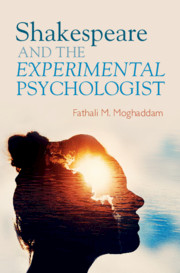Book contents
- Shakespeare and The Experimental Psychologist
- Shakespeare and The Experimental Psychologist
- Copyright page
- Dedication
- Contents
- Preface
- Acknowledgments
- Chapter 1 Introducing Shakespeare’s Psychological Thought Experiments
- Chapter 2 Experimental Research
- Part I Thought Experiments Involving Plays within Plays
- Part II Thought Experiments and the Power of Context
- Notes
- References
- Index
Chapter 2 - Experimental Research
Published online by Cambridge University Press: 10 June 2021
- Shakespeare and The Experimental Psychologist
- Shakespeare and The Experimental Psychologist
- Copyright page
- Dedication
- Contents
- Preface
- Acknowledgments
- Chapter 1 Introducing Shakespeare’s Psychological Thought Experiments
- Chapter 2 Experimental Research
- Part I Thought Experiments Involving Plays within Plays
- Part II Thought Experiments and the Power of Context
- Notes
- References
- Index
Summary
On the surface and on the basis of twenty-first-century criteria, Galileo and Shakespeare live in different worlds: One is in science and the other is in art. But at a deeper level, Galileo and Shakespeare have a foundational similarity: They both rely heavily on thought experiments. Besides, in their era science and art were not separated in the unhealthy way they are today. Thought experiments have been essential and central to the development of both science and art. Contemporary psychology has focused exclusively on experimentally discovering the “causes” of behavior, even though much of a person’s behavior is normatively regulated rather than causally determined. Closer ties with literature and a fuller appreciation of thought experiments will enable psychology to better understand normatively regulated behavior.
- Type
- Chapter
- Information
- Shakespeare and the Experimental Psychologist , pp. 17 - 30Publisher: Cambridge University PressPrint publication year: 2021

